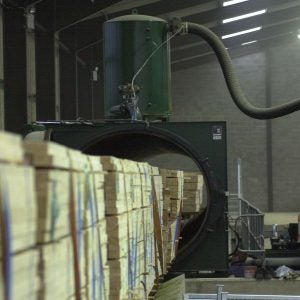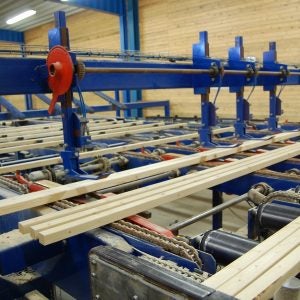When sterling started going pear-shaped after the Brexit vote last summer, it presented a challenge to many sawmills shipping timber to the UK.
This was certainly true of shippers in the Republic of Ireland. For them the UK was their most important market with approximately 80% of the sales conducted in sterling. When the pound dropped by around 15% following the vote, it created a real challenge.
Part of the answer to this challenge could be found in the halls of German woodworking machinery exhibition Ligna earlier this year. There, machinery companies reported that sawmillers were investing in high levels of technology to bring down the cost of their production.
Brodbaek, the manufacturer of sawmills, sawmilling solutions and component production systems, signed an agreement with one of the Irish mills – Coolrain – on its exhibition booth.
Brodbaek marketing manager Claus Hesel said Coolrain was one of three Irish sawmills to invest in new technology in response to the aftermath of Brexit.
Mr Hesel declared that there would be an “Irish spring” in 2018 when the installation of these projects are due to start.
“We have a lot of projects with Irish customers right now,” he said.
“From a Brexit point of view, the pound sterling exchange rate having lost so much [since the vote] means they have to improve their efficiency in order to be more competitive.” Murray Timber and Laois Sawmills have also ordered capital equipment from Brodbaek.
Coolrain is a long-standing Brodbaek customer, stretching back to 1998 when a log cross-cut and chipper station were installed, with several other improvements since then. It supplies products to the construction, garden shed, fencing and packaging markets both in Ireland and the UK.
Its three-step investment strategy encompassed 3D scanning and infeed for chipper canter to achieve better yield; faster multi-rip saw for better capacity; and thirdly automatic sorting and stacking of the increased capacity (+20%) and saving manpower for heavy manual work.
After completing the first two phases together with Brodbaek, Coolrain visited a German Brodbaek customer Holtmeyer & Sohn GmbH to see its line for 3D scanning, tray sorting, trimming, stacking and strapping of short pallet boards.
This resulted in the third project order to cover the next investment step, with the contract signed at Ligna. This will result in eight workers not having to do heavy manual sorting and stacking of boards.
“It is characteristic of the last three to four years that almost all the project orders for us have been developed with customers who have realised the need for higher efficiency and higher yield,” said Mr Hesel.
“As a direct consequence, the development of several investment projects was moved forward and decisions to realise them were accelerated.”
Another sawmill to invest is Murray Timber Ltd, whose background with Brodbaek goes back to the installation of a log sorting line in 1993. Murray supplies construction timber, fencing components, decking and timber for the pallet and packaging sector.
In all, this partnership has seen six installation projects, including a scanning, flexible fair ending, tray sorting, layer cross-cut and stacking line for side boards in 2003, and also a scanning and box sorting line for the main product in 2005.
A stick robot for the stacking followed in 2005, and then a log intake for the main saw line in 2007, with destacking, planing, layer cross-cut and stacking line in 2008.
In the spring, Brodbaek received a project order for a line for resawing, bundling and stacking that is due to be completed for the next fencing season.
The other significant Irish order received in the spring was a project for refurbishing the entire sawmill at Laois Sawmills Ltd, with the completion scheduled for 2019.
Brodbaek’s supply history with Laois also covers two decades, starting with a complete sawline in 1997, log sorting in 1998, a resaw line in 2001, a tray sorting and stacking line in 2002 and then 3D scanning and a new chipper canter BCO 500 in 2007.
The net result of these investments after installation will be a very high level of efficiency among Irish mills, with the optimisation helping them to compete more effectively across multiple markets.
“Our company is experiencing demand for high efficiency and increased yield across its markets currently,” added Mr Hesel.
With the high volume of orders Brodbaek is experiencing, the company is building up its own manufacturing capacity and building strategic partnerships with sub-suppliers to be able to service both new customer work and upgrades to existing customers’ mills simultaneously






